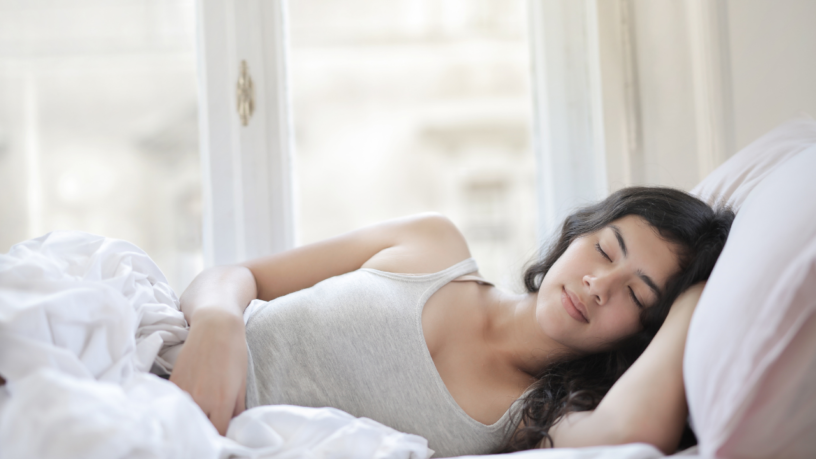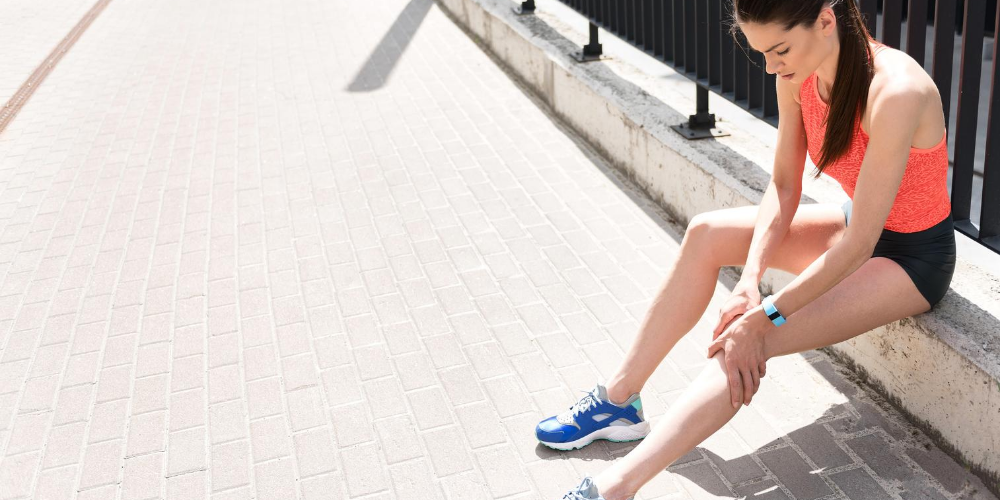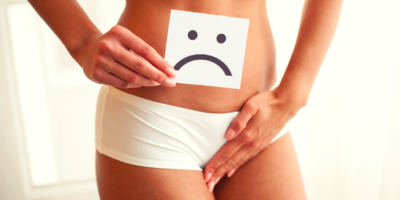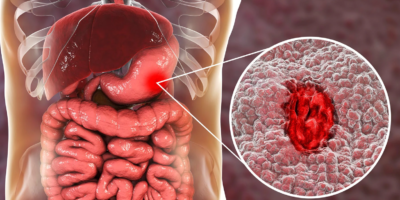Nearly everyone has had at least one fretful night. Unfortunately, 10 percent of adults have chronic insomnia. For a variety of reasons, women are more often troubled with insomnia than are men. Chronic insomnia erodes the quality of life. Compared to their rested peers, people who don’t get enough sleep are at risk for accidents (including car crashes and falls), infections, depression, weight problems, high blood pressure, heart disease, and diabetes. Poor concentration and thinking skills erode productivity. Tired people miss more work and decline social engagements. The personal and societal impact is enormous.


1. Lavender Foot Massage
How it works: Lavender is calming. The essential oil crosses the skin to enter the blood. It also enters via the lungs when you inhale the aroma. Massaging your feet literally takes you out of your busy head to help you settle down for the night. A 2013 study found inhalation of a blend of calming essential oils (lavender, Roman chamomile, and neroli) lowered anxiety and improved sleep quality in cardiac patients in the intensive care unit (a place notorious for disrupting sleep). You don’t have to be sick to get the benefits. A study in healthy Japanese students showed that nighttime inhalation of lavender made them feel more refreshed come morning.
- PREPARATION:
- 1 ounce (28 g) carrier oil (e.g., almond, apricot, grape seed, jojoba, or olive oil)
- 12 drops lavender essential oil (half as much for pregnant women and children)
- DIRECTIONS: Pour the oil and lavender essential oil into a clean jar. Cap and shake. Wash and dry your feet. Sitting comfortably, draw a foot into your lap. Pour a palmful (about 1 tablespoon [15 ml]) of scented oil into your palm and massage it into your foot. Take your time. Switch feet. If it’s a chilly night, put on clean socks. Crawl into bed.
- YIELD: 01 APPLICATION
- VARIATION: Ask a friend or partner to rub your feet (or back) for you. Feel free to experiment with other calming essential oils, such as Roman chamomile, bergamot, rose geranium, melissa (lemon balm), neroli, jasmine, ylang-ylang, and sandalwood. What’s important is whether you find the aroma relaxing.
2. Scented Sleep Pillow
How it works: Studies show that lavender essential oil has a calming effect on the nervous system. In a study of women going through menopause (a change that often disrupts sleep), smelling of lavender improved sleep quality.
- PREPARATION: 2 to 3 drops lavender essential oil
- DIRECTIONS: Cover your pillow with a fresh pillowcase. Rub a couple of drops of lavender essential oil into your palms. Run your palms over the pillowcase to transfer the soothing scent.
- YIELD: 01 APPLICATION
3. Sleep-Promoting Salt Bath
How it works: Warmth helps you relax and sleep. So does lavender. Another theory is that the bath raises your body temperature slightly. Afterward, your temperature falls to normal. That downward shift simulates a decline in body temperature that normally occurs with sleep. Epsom salts are magnesium sulfate. Unpublished research suggests that soaking in an Epsom salt bath can increase blood levels of magnesium, which has a relaxant effect on tense muscles.
- PREPARATION:
- 2 cups (480 g) Epsom salts
- 10 drops lavender essential oil
- DIRECTIONS: Blend the salts and lavender drops in a clean bowl. Draw a warm bath. Pour in the ingredients and disperse with your fingertips. Turn off the electric lights. Light a candle. Slip into the warm, aromatic water. Relax. After you emerge and towel off, crawl into bed.
- YIELD: 01 APPLICATION
4. Lavender Bath Bomb
How it works: The warmth of the bath soothes and relaxes. The Epsom salts relax the muscles. The lavender is calming.
- PREPARATION:
- 1 cup (221 g) baking soda
- ½ cup (65 g) cornstarch
- ½ cup (120 g) Epsom salts
- ½ cup (197 g) powdered citric acid (see note)
- 1 tablespoon (15 ml) water
- 2 teaspoons (10 ml) lavender essential oil
- 1 tablespoon (15 ml) melted coconut oil or vegetable oil
- DIRECTIONS:
In a large glass bowl, combine all the dry ingredients. Whisk until smooth.
In a separate small glass bowl, mix together the liquids (they will not blend perfectly). While continuing to whisk the dry ingredients, slowly add the liquid, about 1 teaspoon (5 ml) at a time—do not add too quickly or the ingredients will react. The final consistency should be like damp (not wet) sand and should hold together in a clump. If too dry, add another teaspoon (5 ml) of oil mixed with a teaspoon (5 ml) of water. If too wet, add small amounts of cornstarch.
Press into muffin tins, filling halfway. Once dry, pop out the bombs and store in a tightly capped jar. Add one bomb to a warm bath and soothe away.
- YIELD: 8 TO 12 BOMBS, DEPENDING ON THE SIZE OF YOUR MOLD
- NOTE: You can buy powdered citric acid in a natural food store, grocery store, or crafts store.
5. Milk It!
How it works: A cup of warm milk has long been revered as a sleep aid. It was once thought that milk’s tryptophan (an amino acid that forms the backbone to the brain chemical serotonin and the hormone melatonin, both of which influence sleep) was the key ingredient. However, more recent studies suggest that commercially sold milk doesn’t really improve sleep. Scientists hold that warm milk before bed is simply soothing—even if it’s all in your head. Cardamom has been traditionally used to settle the digestive system.
- PREPARATION:
- 1 cup (235 ml) milk
- Honey or stevia
- 1 cardamom seed or 1 clove, crushed
- DIRECTIONS: Heat the milk with the cardamom in a small pan. Bring to a boil and then lower the heat to low. Simmer for 3 minutes. Add honey or stevia to taste. Simmer for 1 minute more. Remove from the heat and cover. Set aside for 5 minutes. Strain. Drink the warm milk before going to bed.
- YIELD: 01 SERVING
Fact or Myth?
- TAKE A NIGHTCAP TO BRING ON A GOOD NIGHT’S SLEEP. Myth. Alcohol can help you fall asleep. However, as the body breaks down alcohol to a more toxic intermediary chemical (acetaldehyde), sleep becomes restless and fragmented. Moderate your alcohol intake: no more than one glass for women, two for men. If you enjoy a drink, have it with dinner and then quit.
- NAPPING IS ONE GOOD WAY TO GET THE SLEEP YOU NEED. Yes and no. Studies show that a well-timed nap can help you function better and help lower blood pressure. However, a long, late nap could throw your nighttime sleep schedule—and your important quota—off track.
Lifestyle Tip
- Drink a cup of chamomile tea. Used as a tea, the herb German chamomile has been a popular sleep remedy since ancient times. It has sleep-promoting and antianxiety effects. A preliminary study showed significant improvement in daytime functioning but only small benefits for sleep quantity and quality in a group of chronic insomniacs taking a chamomile extract. Drink tea at least an hour before bedtime to avoid being awakened by a full bladder.
- For you, travelers, supplements containing the hormone melatonin are helpful for jet lag and other shifts in a daily rhythm. most studies have used 2 to 8 milligrams, taken for up to three days before departure at the time corresponding to bedtime at the destination. Travelers can also take advantage of sunlight to get in sync with the new time zone. early morning light will shift your clock earlier (earlier awakening, earlier to bed). Bright light later in the day shifts your clock later (later to bed and to rising). Because melatonin levels decline with age, supplements also seem to help elderly people with insomnia. Discuss that option with your doctor.
- Snack wisely before bed. A small piece of whole-grain toast or bowl of oatmeal may help you sleep. The carbohydrates may help move the amino acid tryptophan from the blood into the brain, where chemical processes can convert it to melatonin. A light snack can also prevent blood sugar from dropping too low during the night. Low blood sugar activates stress hormones, which may wake you up. “Light” is the operative word. A heavy late-night meal can interfere with sleep.
- Chill on the caffeine. It takes 5 hours for your body to eliminate half of the caffeine circulating in your blood—double that time in women who are pregnant or on oral hormonal contraceptives. If you want to sleep, avoid late afternoon and evening consumption. And be aware that many soft drinks, green and black tea, chocolate, and “energy” drinks contain caffeine. Some medications (e.g., decongestants and certain antidepressants) can aggravate sleep problems. Diuretics taken late in the day can lead to nighttime bathroom trips. Talk to your doctor about taking medications in the morning.
When to call the doctor
- It takes more than 30 minutes to fall asleep.
- You awaken during the night.
- You feel unrefreshed when you arise and/ or sleepy during the day despite attempts to allow yourself enough time in bed.
- You have symptoms or signs of a sleep disorder (snoring and breath-holding during the night, unpleasant sensations or movements in limbs that keep you awake, etc.)






Leave a Reply